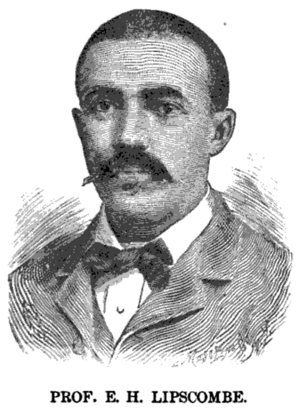Edward Hart Lipscombe facts for kids
Quick facts for kids
Edward Hart Lipscombe
|
|
|---|---|

Lipscombe in 1891
|
|
| Born | September 29, 1858 |
| Alma mater | Shaw University |
| Occupation | Educator, journalist, minister, poet |
| Political party | Republican |
| Religion | Baptist |
Edward Hart Lipscombe (born September 29, 1858) was an important educator and religious leader in North Carolina during the late 1800s. He taught at Shaw University and helped start a newspaper called the African Expositor. Later, he led the Dallas Institute, which grew into the Western Union Institute. This became a very important Baptist school in Asheville, North Carolina.
Contents
Edward Lipscombe's Early Life and Education
Edward Hart Lipscombe was born on September 29, 1858, in Orange County, North Carolina. He was the oldest of four children. In 1868, he moved to Raleigh to attend a school run by William Warrick. However, he returned to his family's farm in 1870 to help his mother.
Joining the Jubilee Singers
In 1873, Edward got a special invitation from Augustus Shepperd. He was asked to join the North Carolina Jubilee Singers. This group, led by Nettie M. Sage, traveled to raise money for Shaw University. Edward joined them on a tour through New England, Canada, and Nova Scotia.
Studying at Shaw University
After the tour, Edward enrolled at Shaw Collegiate Institute, which is now Shaw University. He worked hard and graduated in 1879. He was the youngest person in his graduating class. While he was still a student in 1877, at just 19 years old, he helped start a newspaper called the African Expositor. He worked as an editor alongside his professors, Henry Martin Tupper and Nicholas Franklin Roberts. After graduating, he became a professor of math and languages at Shaw University from 1879 to 1881. In 1882, he earned another degree, an A.M., from Shaw.
Edward Lipscombe's Career as an Educator and Leader
Edward Lipscombe dedicated his life to education and community leadership. He held many important positions that helped shape schools and communities in North Carolina.
Leading Schools and Publications
In 1881, Edward became the principal of the Washington Graded School in Raleigh. This was the largest school in the city at the time. The next year, in 1882, the Baptist State Convention of North Carolina asked him to be an editor for their newspaper, the Baptist Standard.
In 1883, he left the Washington Graded School to return to Shaw University. There, he became a professor of public speaking and moral philosophy. He also went back to editing the African Expositor. That same year, he became a minister and was chosen as a leader for the Baptist State Convention of North Carolina. He also supported the temperance movement, which worked to reduce alcohol use. He tried to get the Republican Party to support this movement. In 1884, he was considered for a position in the North Carolina General Assembly, but he chose to focus on education instead.
Developing the Western Union Institute
For a short time in 1884, Edward was the principal of Durham Graded School. After that, he became the principal of the Dallas Academy in Dallas, Gaston County. This school was run by the Western Baptist Missionary Union. Edward was very successful there. He even helped students collect wood for heating and building projects.
In 1886, the North Carolina State Teachers' Association named him an educational adviser for Gaston County. He also helped start a local branch of the Prohibition Party in Gaston County. Thanks to Edward's efforts, the Dallas Institute moved to Asheville in 1886. It changed its name to the Western Union Institute, and Edward became its president.
Community Work and Other Roles
In the 1890s and early 1900s, Edward Lipscombe continued his work in Asheville. He became the principal of the Catholic Hill School. He also served as president of the Asheville Young Men's Institute. In 1898, when the Spanish–American War was starting, Edward helped recruit Black soldiers from the Institute to join the army.
In 1899, he was hired to lead the civil government and U.S. History department for a summer teacher training program at North Carolina Agricultural and Technical State University in Greensboro. By 1904, he was working as a financial agent and principal for the Zion Academy. In 1906, he became the pastor of the First Baptist Colored Church in Wadesboro, North Carolina.
Writing and Publishing
Besides being an editor, Edward Lipscombe wrote many poems. Some of his poems were published in the African Expositor. He also helped start another religious newspaper called the Light-House in 1884. In 1886, this paper changed its name to the Mountain Gleaner.
Edward Lipscombe's Family Life
In 1882, Edward Lipscombe married Lizzie L. Taylor. She was from Lynchburg, Virginia. They had three sons and one daughter. Sadly, only their youngest child, their daughter, lived to become an adult.
Images for kids
 | John T. Biggers |
 | Thomas Blackshear |
 | Mark Bradford |
 | Beverly Buchanan |


